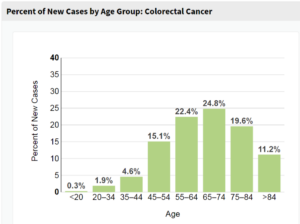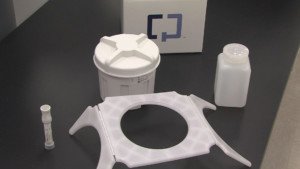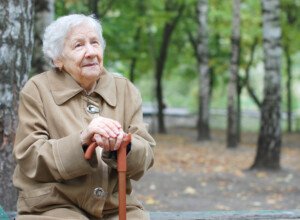At what age does the colon become thin enough in which the risks of a screening colonoscopy outweigh the benefit of catching a precancerous polyp or even early colon cancer?
The percentage of annual new cases of colon cancer in the U.S. among people 75 to 84 is 19.6%, according to the National Cancer Institute Surveillance, Epidemiology and End Results Program. In people 85 and over, it’s 11.2%.
So in total, almost 31% of new colon cancer cases every year are in people over 74. That’s a good chunk of the cases. See the graph below.

This means if your last colonoscopy was at 70 and was normal, you’re due for one at age 80 if you’re at average risk for your age.
Of course, your colon will be thinner at 80 than at 70. It’ll be thinner at 90 than at 80. Things tend to thin with age.
Suppose a 90-year-old had a normal colonoscopy at 80, 70, 60 and 50. Should he or she have one at 90?
You should never assume that just because all those previous colonoscopies were normal, that you’re immune to colon cancer developing in very old age.
First of all, what if your heart and kidneys are still going pretty good and you have another 10 years in you from that standpoint?
A relatively healthy heart and kidneys won’t prevent colon cancer. A healthy brain, venous system, pancreas and liver won’t prevent colon cancer.
Secondly, an interval cancer may develop between the colonoscopy at 80 and the tenth year out from that.
Yes, colon cancer can develop in between colonoscopies. If you skip a scope or an alternative method of screening, this will allow the cancer to grow and spread.
A third consideration is that a precancerous polyp may have been missed on that last colonoscopy.
Yes, precancerous polyps can be missed. If you forego the next screening colonoscopy, that polyp will have a chance to become malignant and spread.
So where you could’ve lived to 100, you might end up dying at 92 from colon cancer because you didn’t have a screening procedure at 90 which would’ve led to discovery of the cancer at an earlier and more curable stage.
But what about the risks of a colonoscopy to an old thin colon?
“Colonoscopy should not be performed when the risks outweigh the benefits,” says Joseph Weiss, MD, a board certified gastroenterologist and clinical professor of medicine at the Medical School, University of California, San Diego.
“The most common complications due to the procedure itself, and not its associated anesthesia or sedation, is bleeding and perforation.
“The thinner the colon wall is, the greater the risk of perforation.
“A perforation can occur from the tip of the instrument being advanced, pressure of the length of the instrument bowing against the side wall of the bowel, air and water pressure of the colon being inflated, tissue burns with the use of electrical cautery laser or heat probes, chemical injury from injections, and from the removal of tissue by biopsy or polypectomy.
“While the average risk of perforation is less than one in 1,000, the risk can be substantially higher in subsets of the population.
“The risk is increased in the elderly, when the colon is inflamed (fulminant colitis) or infected (diverticulitis), known or suspected perforation, inadequate cleansing preparation or recent colonic surgery.
“The wall of the colon is relatively thin, especially at its starting proximal portion known as the cecum and ascending colon.
“It can become thinner with age, inflammation, radiation, distention, medications, post-surgical scarring and other conditions such as connective tissue disorders.”
Elderly people need to discuss the risk/benefit ratio of a colonoscopy with their gastroenterologist.
Multiple factors will be considered, especially if the patient has a history of precancerous polyps or a family history of colon cancer, especially under age 65.
Alternative Screenings for Colon Cancer in Old Age
Dr. Weiss explains, “Many specialists suggest that routine screening with colonoscopy should not be performed after age 85 because of the increased risk of the procedure.
“Non-invasive screening that does not rely on colonoscopy is always an option in the elderly, and at younger ages as well.
“This includes stool test for occult blood known as fecal immunochemical test (FIT) which is painless, rapid, very safe, effective and inexpensive as a screening test.

Cologuard kit for detection of blood in the stools.
“Other possible tests include multitarget stool DNA test in combination with FIT (Cologuard), virtual colonoscopy using CT scan colonography, video capsule colonoscopy, and newer blood and urine tests for metabolic markers and DNA.”
 Dr. Weiss is the author of Got Guts! A Guide to Prevent and Beat Colon Cancer. He has also presented numerous presentations on various health topics.
Dr. Weiss is the author of Got Guts! A Guide to Prevent and Beat Colon Cancer. He has also presented numerous presentations on various health topics.
 Lorra Garrick has been covering medical, fitness and cybersecurity topics for many years, having written thousands of articles for print magazines and websites, including as a ghostwriter. She’s also a former ACE-certified personal trainer.
Lorra Garrick has been covering medical, fitness and cybersecurity topics for many years, having written thousands of articles for print magazines and websites, including as a ghostwriter. She’s also a former ACE-certified personal trainer.
.



























